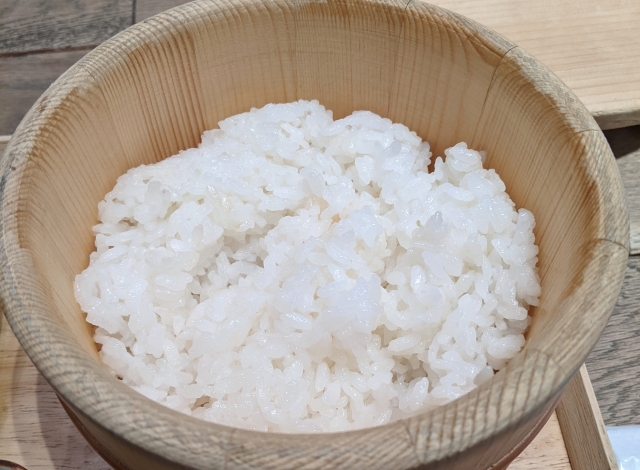
Cooked in a traditional earthenware pot, there’s something about this Maboroshi no Koshihikari rice that almost spirited him away.
It only took until he turned 49 years old, but our bread-loving Japanese-language reporter Mr. Sato has finally fallen in love with rice. The other day, he was so overcome by a craving for the good stuff that he typed “yummy rice Tokyo” into Google to see what he could find. Salon Ginza Sabou in Tokyo’s Ginza district is what popped up first, so he decided to make a beeline there.
The restaurant is located in the second basement floor of the Tokyu Plaza Ginza shopping building, right outside the ticket gates for the Tokyo Metro Marunouchi Ginza Line at Ginza Station. It has a welcoming, bright atmosphere.
Mr. Sato got good vibes as soon as he sat down to look at the menu as the very first page provided an explanation of the “Yukihotaka” variety of Maboroshi no Koshihikari rice. The Koshihikari brand is already one of the most famous around the country, and this particular variety has won prizes for ten years running in a national tasting contest. It’s even been recognized by the Imperial Household as a superior rice cultivar. There was no way that this rice wouldn’t knock his socks off.
▼ To top it off, the restaurant cooks it in a traditional Iga Ware earthenware pot.
For a set teishoku meal, there are four main dishes and 12 side dishes, from which you can choose one and three from the list respectively. You can also choose your preferred style of rice, whether it’s the white Yukihotaka, germinated brown rice, or super barley rice–which costs an extra 220 yen (US$1.66).
Similarly, it was going to be an impossible task for him to choose his side dishes. The Sugita Ume (Japanese apricot) from Yokohama cost an extra 350 yen but greatly piqued his interest. However, he eventually had to bite the bullet and choose something if he wanted to eat anything at all.
In the end he decided to go with the most expensive set meal at 2,200 yen which featured simmered splendid alfonsino (a bright red fish) as the main dish. In addition to his Yukihotaka rice served in a wooden tub, the set also came with free miso soup.
The arrangement of the fish with vegetables was gorgeous. It included boiled spinach, fried Japanese eggplant, and Manganji pepper garnished with spring onions, threads of chili pepper, and even edible chrysanthemum flowers.
As intricate as that looked, Mr. Sato always has a soft spot for side dishes and decided to begin with those. He had ordered boiled rapeseed blossoms, simmered domestic young bamboo shoots, and stewed cod roe.
First, however, he opened the lid to the rice to admire it. This photo doesn’t quite do it justice, but it was pure white in color and almost seemed to be shining out.
He portioned some out in his rice bowl and took a bite, at which point he could appreciate its springy and glorious texture. A subtle sweetness grew in his mouth the more he chewed. It was as if he could almost feel the power of the earth emanating from the grains…who needed other dishes when he could just eat this?! The grains didn’t get stuck in his throat, either, but washed down very smoothly with water as if he were eating noodles.
The side dishes were also simple in preparation to draw out their natural flavor. The bonito flakes covering the rapeseed blossoms were particularly good. He started fantasizing about pairing these flakes along with the Yukihotaka rice in an onigiri rice bowl–he might not be able to recover from such a combination.
The bamboo shoots were also just lightly seasoned. He enjoyed the feeling of taking a crisp bite out of them.
This dish also came with the leaf bud of a Japanese pepper tree. It looked like it had just popped open, and as a result, Mr. Sato felt that some door to his hidden youth also burst open at that moment. Isn’t spring wonderful?
Finally, the cod roe was the perfect complement to the rice. He alternated bites of each and felt that his appetite could continue forever.
Speaking of which, he didn’t even try to fight against that temptation and was already working on his second bowl–all without touching the main dish yet!
Now, Mr. Sato was usually content with one just one bowl of rice, yet here he was finishing a second. He called out for more and his wooden tub received another two servings of the magical Yukihotaka.
He happily got his third bowl ready to go and prepared to take on the main dish that he had saved for last.
The fish was super thick and fleshy.
Perhaps because of that, it was a little bit light on flavor. He wished there was just a tad more ginger to add a burst of something. That certainly didn’t stop him from consuming the whole thing, though.
And so, Mr. Sato somehow made it through his meal of way more rice than he typically eats. He encourages you all to visit Salon Ginza Sabou if you’d also like to experience just how addicting good white rice can be. Just be careful that you don’t overeat, like our team is prone to do!
Restaurant information
Salon Ginza Sabou / サロン ギンザサボウ
Address: Tokyo-to, Chuo-ku, Ginza 5-2-1 B2 floor
東京都中央区銀座五丁目2番1号 B2F
Open: 11 a.m.-10 p.m.
Website
All images © SoraNews24
● Want to hear about SoraNews24’s latest articles as soon as they’re published? Follow us on Facebook and Twitter!
[ Read in Japanese ]